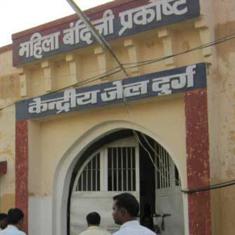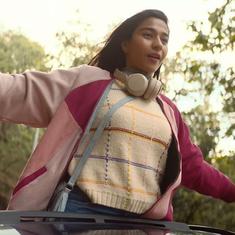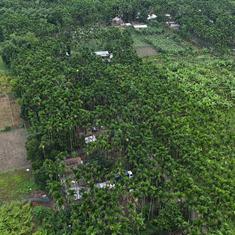A darkness is rising in India. Mobs are violently acting out visceral hatred, targeting people because of their faith and caste.
These assaults are characterised by bystanders who actively support the killing, or do nothing to stop it. Pehlu Khan is killed on a busy national highway. In Una, the attackers circulate videos of the whippings of Dalits, convinced of their valour and impunity. Mohammad Akhlaq is lynched by his neighbours. Junaid Khan is stabbed 30 times on a crowded train.
As lynching threatens to grow into a national epidemic, Indian Muslims are learning to endure an intense sense of foreboding – a lurking, unnamed, unspoken fear. This is not simply the apprehension of discrimination, of being treated as the “other” – in classrooms, public spaces, residential colonies. This they have long become accustomed to. What is new is the persisting danger of imminent violence, of being vulnerable to attack anywhere – on a road, in a bus or train, at a marketplace, even in their homes – only for looking and being Muslim.
In the tribal regions, Christians too are feeling a mounting dread. There is another community that has long lived with everyday violence and humiliation, the Dalits. But they too are now fearful of attacks for pursuing their socially demeaning caste vocation of skinning cows.
How culpable are we when our brothers and sisters are burned and lynched and we stand by?
We need to interrogate the reasons for our silences, for our failures to speak out and intervene when murderous hate is unleashed on innocent lives. We need our conscience to ache. We need it to be burdened intolerably.
Darkness can never be fought with darkness, only light can dispel the enveloping shadows. So, to speak to our collective silences, we propose to embark, with as many comrades who wish to join, on a journey of shared suffering, of solidarity, of atonement, and of love.
In solidarity
We have joined hands to undertake this journey across parts of India worst affected by lynchings. The purpose is twofold: to respond to the everyday fear of Muslims, Dalits and Christians, and the worrying silences of the majority. We aim to declare that we stand with our Muslim, Dalit and Christian sisters and brothers in this hour of gathering darkness. But the journey is also a call of conscience to India’s majority.
We propose this as a large collaborative civil society initiative, a month-long journey which will include visiting families of those who lost loved ones to hate lynchings. It will be called Karawan e Mohabbat. It will be a journey for sharing pain, for atonement, for solidarity, and for love.
The journey will begin from Nellie in Assam on September 4 and end at Porbandar in Gujarat on October 2. The first phase of the Karawan will cover Assam, Jharkhand, and possibly Karnataka.
We will gather again at Tilak Vihar in Delhi on 11 September. In this second phase, we will travel together by bus. From Delhi, the Karawan will move to western Uttar Pradesh, Haryana, Rajasthan, and on to Gujarat. This phase will culminate at Mhow, the birthplace of BR Ambedkar. In the third phase, we will visit Kandhmal and Tsundur. The Karawan will conclude in a large programme in Porbandar, the birthplace of Mahatma Gandhi, on his birth anniversary, October 2.
The major aim of the Karawan will be to visit families that have suffered from lynchings in each of the places: Assam, Jharkhand, possibly Karnataka, western Uttar Pradesh, Haryana, Rajasthan and Gujarat. We will offer our atonement and solidarity to each family. We will try to assess how the family is coping and what they need for livelihood and the pursuit of justice. In advance of our visit, a team will spend at least a week with each family. They will try to constitute an Aman committee, with members from Muslim, Dalit and Hindu groups (and Adivasi and Christian groups where applicable). The Aman committee will commit to support the family for justice and livelihood, and promote amity, goodwill and peace in the larger community.
After we meet with the family, we will, with the help of the Aman committee, organise a public meeting – an Aman Sabha – on the themes of love and solidarity, preferably hosted in the settlements of the majority community. There will be singing on these themes by singers who we hope will accompany the Karawan.

Unhealed wounds
In the course of the Karawan, we wish to also symbolically acknowledge the long history of mass targeted violence against various vulnerable communities in India after Independence, with their unmet justice and unhealed wounds. We start at Nellie because the largest post-Partition massacre occurred there in 1983, and not one person has been punished for it.
The same reason compels us to visit the 1984 widows’ colony at Tilak Vihar in Delhi – the Sikh widows too have suffered from monumental denial of justice. Kandhamal, Odisha, is another site of unhealed wounds and prodigious injustice. It is critical to acknowledge the history of atrocities endured by the Dalits for generations, so we will visit Tsundur in Andhra Pradesh as well.
Finally, we will visit Mhow to pay tribute to Ambedkar for leading the writing of India’s Constitution, and to be mindful of his caution to all of us that the core of democracy and our Constitution is fraternity. It is fraternity that is most under attack in India today. The last point of the Karawan on October 2 will be Gandhi’s birthplace, to recall his lifelong belief in Hindu-Muslim unity.
In the Karawan, we hope to include a team of chroniclers – writers, poets, photographers, videographers – who will record what they see and share it in real time with the world. We seek also to have some speakers, singers, musicians, maybe even stand-up comedians who will communicate to local audiences in the areas stricken by hate our message of love and solidarity.
For the lynchings and the climate of hate, this Karawan will point to the culpability of the governments, political parties, partisan administrations, and marauding mobs. But most of all, it will reflect on the culpability of all of us, of the silent bystanders. It will ask us to interrogate the reasons for our collective silences, for our failures to intervene when murderous hate is unleashed.
The journey is a humble tribute to Gandhi’s last and finest months. A million people had died in Hindu-Muslim riots that accompanied the Partition, yet he bravely walked alone in Noakhali for love and peace, even as the entire country was engulfed and ripped apart by hate.
In our appeal, we say, “We need our conscience to ache. We need it to be burdened intolerably. Darkness can never be fought with darkness, only light can dispel the enveloping shadows.” To speak thus to our brothers and sisters, and to our souls, we propose to embark on this journey of shared suffering, of solidarity, of atonement and of love. A Karawan e Mohabbat.
Karawan e Mohabbat is supported by All India Secular Front, Alliance Defending Freedom, Alternative Law Network, Anhad, Aman Biradari, Centre for the Study of Society and Secularism, Decentralised Cotton Yarn Trust, Delhi Forum, Idea of India Collective, Ekta Parishad, Indian Cultural Forum, Mahila Kisaan Adhikar Manch, Mazdoor Kisaan Shakti Sangathan, National Alliance of People’s Movements, National Campaign for the People’s Right to Information, National Campaign on Dalit Human Rights, National Federation of Indian Women, Newsclick, People’s Union for Civil Liberties, Right to Food Campaign, Timbaktu Collective, Vikalpa Sangam, Wada Ni Todo Abhiyan, and many others.










